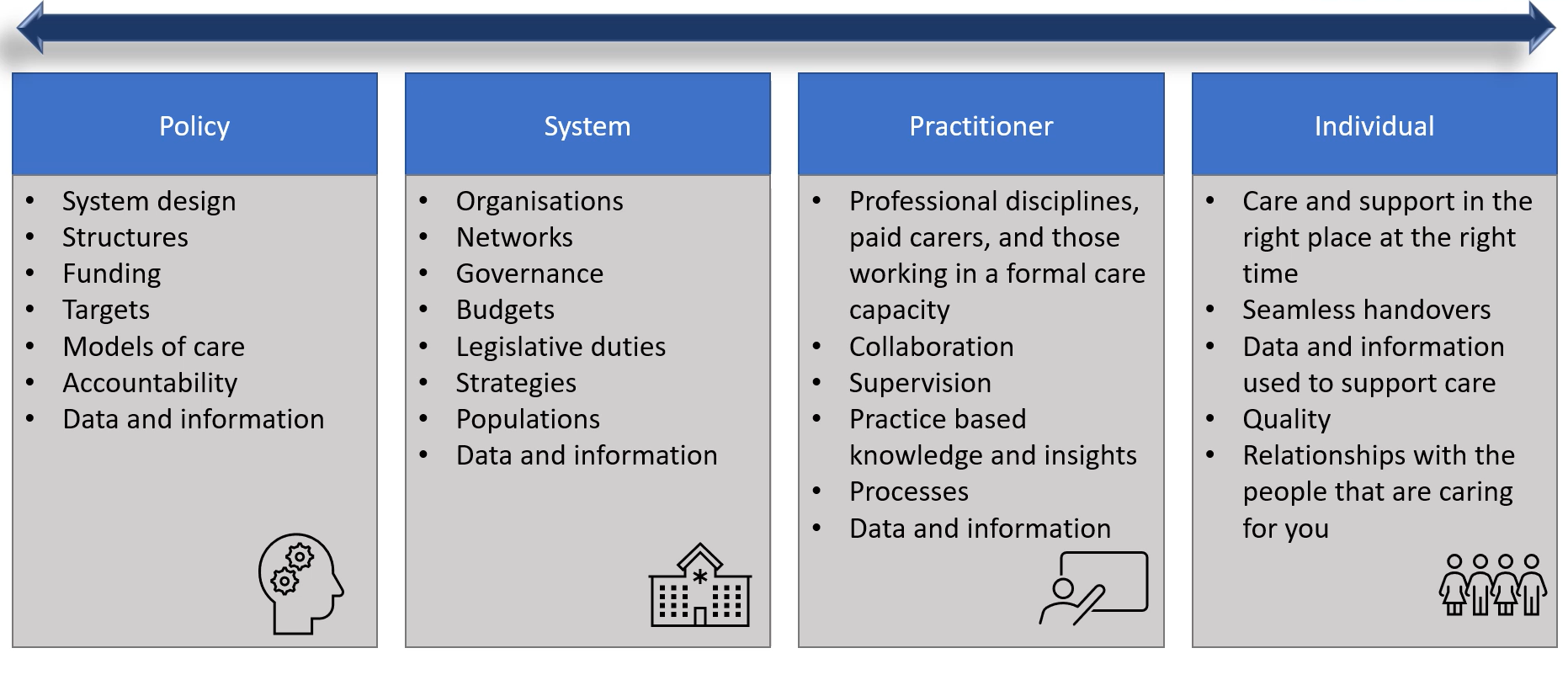Much of the conversation around integration talks around the technical aspects – who has responsibility for delivering different aspects of services, and how different issues are picked up in different parts of the system.
At our Leaders’ Forum in 2022 it was interesting to hear about the relational aspects of service integration.
Using different lenses to examine integration
There have been numerous attempts at both integration and reorganisation over the years. It is not a new topic, but the advent of Integrated Care Boards enabled us to have many timely discussions at this year’s Leaders’ Forum.
Usha Boolaky prompted us to use different lenses to look at integrated care, which was helpful as it highlighted the complexity of integration.

Talking about it in binary terms (whether a service is integrated or not) can lead to an over-simplification of what is undoubtedly a very difficult thing to achieve.
Breaking that down helped us to interrogate a question that Richard Humphries posed to us:
If integrated care is the answer, what is the question?
Richard Humphries
Richard shared an interview with Prof. Donna Hall, who talked about the wrap-around service that citizens expect. Donna discussed the importance of people getting on with each other and why we must centre the person, the patient, the place. It is interesting to hear her talk about why the current model of public service is broken.
Her points echo much of what Dr. Adam Lent talked about in last year’s Leaders’ Forum, when he led a conversation around New Local’s report on the Community Paradigm – we need to be creative, imaginative and focus on strengths.
Collaborative working to support Transitional Safeguarding for young people
Colleagues in Haringey, Beverley Tarka, Director of Adults, Health and Communities and Ann Graham, Director or Children’s Services shared how they work together to support Transitional Safeguarding in their organisation.
They highlighted the importance of collaboration across the whole organisation and how Transitional Safeguarding is everybody’s business. Also, how community, culture and relationships can be used as strengths and a resource to support young people sustainably over the long term.
This video features Beverley Tarka, Director of Adults, Health and Communities in conversation with Ann Graham, Director or Children’s Services, both from Haringey Council. The pair discuss how they work together to support Transitional Safeguarding in their organisation.
Learning from Wakefield Council’s approach to integration
We have been fortunate to learn from and evaluate Wakefield's work as they have been integrating children and young people’s services. They have been kind enough to share their journey with us in a series of blogposts on evaluating the integration of services, the vision and opportunity for Wakefield Families Together; and what effective collaboration and integration looks like.
Anne-Marie Spencer shared how the work was planned and taken forward in her role as Service Manager for Strategy and Transformation, before Joe Seddon outlined how their Team Around the School and Team Around the Early Years models work. We often talk about the value of human relationships when thinking about the people who access services, but less so when we talk about service change. We want agency in our work, and to be worked with, not done to.
This chimes with what Dan Pink shares in his book ‘Drive’, where he outlines how autonomy (the desire to direct our own lives), mastery (the urge to get better at something that matters) and purpose (to do what we do in the service of something larger than ourselves) are key to motivation.
Joe Seddon shares how Wakefield Council have moved to develop integrated support for children across the area through a geographical network of clusters and a The Team Around the School / Early Years Model.
Integration to improve support for SEND children
Dame Christine Lenehan challenged the complexities of a system ‘not designed to meet the needs of children and families’. Christine highlighted how the barriers to integrated working stem from rigid structures in our society – such as the boundaries and siloed working of governmental departments which is replicated in other systems and organisations such as Health and Education at a regional and local level. Christine highlighted how language is a critical factor in bridging the divide between departments and the importance of staff working relationally across the cultural divides.
Christine shared varied examples from her many years of experience where siloed working had disadvantaged SEND children – such as debates over which department would pay for equipment leading to spending more money on bureaucracy than the support for the children.
Christine highlighted an example of successful integrated working in her role on an Integrated Care Board supporting them to embed SEND as a priority. Christine explained how the board were integrating local level data from different sources to build an indicator set with children at the centre – a combined vision from people working across Health, Education, Social Care, voluntary sector and centring the experiences of children and parents to meet the aims of the board and ensure the children do not get lost in the system.
She passionately advocates for multiagency working, combining the talents of all the professionals that work around the child and bringing them together with the children and families around decisions on their care and support and to improve day to day life.
Working effectively with people with dementia
Philly Hare interviewed George Rook around what we can learn from the Dementia Enquirers work. This powerful film really helped us to understand what it feels like to lead work that aligns with your own priorities and values. George shared lots of helpful advice around what works, which was helpful to consider when working with people living with dementia, as well as people with wider lived experience. His advice chimed with much of what the Government Digital Service talk about around making information accessible - ‘It's not dumbing down, it's opening up.’
It is perhaps too easy to see this as a message for communications teams alone, as it is much bigger than that.
If we can make our organisations feel less remote, then we will be much closer to ensuring that the people in our communities can connect with our work. Not because we are seen as the gatekeepers of support that they want to access, but because we can help them to lead the lives that they want to lead.
Philly Hare interviews George Rook to discuss what effective involvement of people living with dementia might look like. They share learning from the Dementia Enquirers Programme, sharing the key learning points for leaders.

